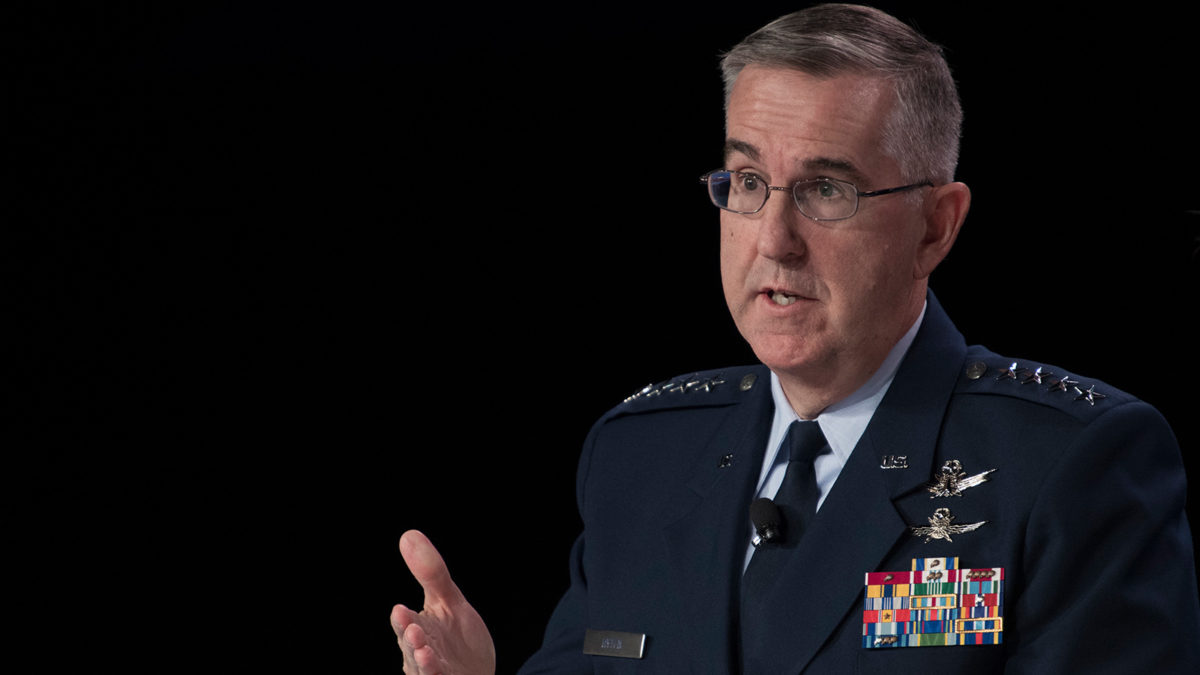Hyten: Space Force should not be separate branch
By Cat Hofacker|July 30, 2019
Nominee for vice chairman of Joint Chiefs denies sexual assault allegations from former aide
The White House’s nominee for vice chairman of the Joint Chiefs of Staff told lawmakers today that a U.S. Space Force should remain under the Air Force, the latest indication that President Donald Trump might not get the separate armed service branch he proposed a year ago.
U.S. Air Force Gen. John Hyten offered a simple explanation for his reticence when questioned by Sen. Joe Manchin, D-WV, during the nomination hearing: “I think that’s how you keep the bureaucracy from going crazy,” adding that the Space Force would not be “big enough to bring out” as its own branch.
Hyten fielded questions during his nomination hearing before the Senate Armed Services Committee. If confirmed by the full Senate, one of Hyten’s roles would be to chair the Joint Requirements Oversight Council that assesses the requirements for major new military equipment, including satellites.
Trump broached the idea of the Space Force in a March 2018 speech at a Marine Corps base in California, saying: “We have the Air Force; we’ll have the Space Force,” although he couched the idea as a “maybe.”
He reiterated the idea in a June 2018 National Space Council meeting, where he called for a “separate but equal” sixth branch. Then came a twist and turn. In February, Trump directed the Department of Defense to write a legislative proposal that would establish the service under the Air Force. But since then, both he and Vice President Mike Pence have returned to advocating for an independent Space Force.
“We are working as we speak with Congress to stand up a sixth branch of our armed forces,” Pence told attendees in May at the 2019 Satellites conference in Washington, D.C. “The United States Space Force will soon be a reality.”
Despite the administration’s enthusiasm, most lawmakers haven’t gotten on board. The House and Senate versions of the fiscal year 2020 National Defense Authorization Act include provisions for a Space Force — or Space Corps, in the case of the House — but neither establishes a separate service branch devoted to space.
Hyten voiced his support for the bills today, telling lawmakers “I think we’re in a very good place now as far as the legislation that’s been proposed.”
Although the bills differ on several points, both would add the commander of Space Force to the Joint Chiefs of Staff, a move Hyten said “I do believe” is necessary.
“I think it’s going to be similar to the Marine Corps, where the commandant of the Marine Corps is on the Joint Chiefs of Staff but the Marine Corps is part of the Navy,” Hyten said.
If confirmed as vice chairman, Hyten would become the second-highest ranking military officer in the United States Armed Forces. Currently the commander of U.S. Strategic Command, his confirmation has been delayed by accusations of sexual assault from a former aide. Army Col. Kathryn A. Spletstoser told the New York Times and Washington Post that Hyten made unwanted sexual advances toward her in 2017. Hyten has denied the allegations, telling senators today “Nothing happened. Ever.”





